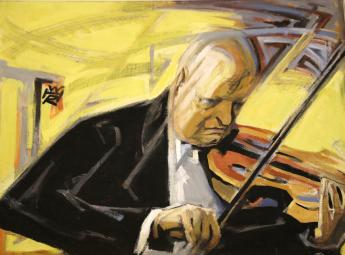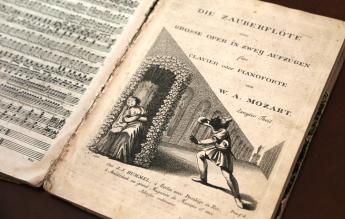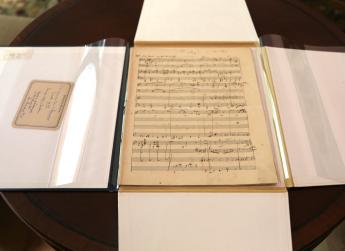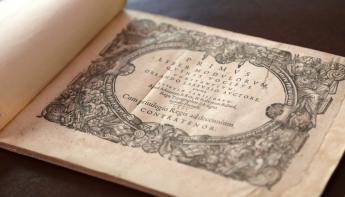Antiquarian Booksellers' Association of America J & J Lubrano Music Antiquarians LLC
Music Antiquarians: John and Jude Lubrano
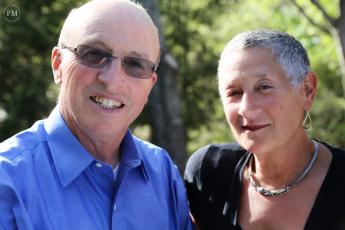
An Interview with Final Note Magazine
Nestled in the heart of the Syosset hamlet, New York, is a true treasure trove of musical riches, carefully, and lovingly, curated by John and Jude Lubrano. Since 1977, the dynamic duo have established themselves among the leading international dealers in antiquarian music and dance material. Their collection boasts a tantalising myriad of autograph musical manuscripts and letters of composers; rare printed music; rare books on music and dance; and original prints, drawings and ephemera relating to music and dance. The Lubranos' clientele includes private collectors, and many of the most celebrated libraries and museums of the world.
John and Jude kindly invited Final Note onto their alluring premises to allow us to photograph some of their stunning collection, and share their intoxicating love for music and rare books with our readers.
Jude, when did your love of books first begin?
My appreciation of rare books, in general, and the history of books and printing, in particular, really began with my studies at Columbia. This appreciation is highly contagious, and soon infected John, who was to become my husband (and business partner!) a few years later.
How did you both meet?
We were both studying at Cornell University in Ithaca, New York, and met at a lecture/demonstration/sit-in on the very first Earth Day, April 22, 1970, introduced by a mutual friend.
John, why did you decide to leave the hotel business and go back to do a degree in music in Australia?
I became somewhat disillusioned with the rather 'corporate' nature of the hotel industry, and decided to pursue my love of music. I studied at Cornell and at two universities in Australia: the University of New England in Armidale, and the University of Sydney. I liked the fact that the program in Armidale was small and very personalized; it allowed me to pursue my interests in musicology, composition, and ethnomusicology in an intimate, supportive and encouraging environment, thus providing a firm foundation for my continuing studies at Sydney University.
Jude, what motivated you to take studies in librarianship?
At the risk of sounding trite, I’ve always liked to both read and write. After finishing my Bachelor’s degree at Cornell I wanted to pursue more specialized training in a profession that would allow me to be around books. I thus went on to do a degree in librarianship at Columbia University, which, at the time, had the most dynamic program in rare book librarianship. While there, I was very fortunate to get a job working for Thomas F. Heller, a rare book dealer in New York. He was an older man, born in Vienna, and had been in the antiquarian book trade for over 40 years. His wife and partner in the business had died 3 weeks before I came to work for him, and I thus had some very big shoes to fill. It was truly “baptism by fire,” and although he specialized in the history of science and medicine, the opportunity to work with him allowed me an invaluable glimpse into the wild and wonderful world of antiquarian bookselling.
Tell us about your journey from Australia to the US.
We left Sydney in May of 1977, and took a number of months to travel to New York, spending the majority of our time in Bali, Singapore, Thailand, Greece, Italy, and France, availing ourselves of any and all opportunities to attend authentic performances of traditional music and dance whenever, and wherever, we could. Our first stop was Bali, at a time when the island was very much less touristed than it is today. We rented a small motorbike, and toured the island extensively, one day coming upon a very small village in the hills, which specialized in the fabrication of instruments for the gamelan orchestra. We were shown the bell forge and, with very active gesticulation as we knew very little Malay, were treated to an explanation of the manufacturing process. We were later invited to attend a very exciting local gamelan competition, in which orchestras from neighboring villages vied for supremacy. We also attended traditional outdoor wayang puppet performances on a number of evenings. In Singapore, as a result of our efforts to bring attention to someone trying to pickpocket a Sikh priest at the markets one night, we were invited to attend a private Morning Prayer ceremony at an ancient temple which included a stirring performance of Indian ragas. During an extended sojourn in Greece, we heard much traditional music and witnessed much traditional dance.
Why did you decide to set up 'J&J Lubrano Music Antiquarians' in 1977, and how challenging were the early days?
While visiting family on the island of Procida, we were sitting on a hillside overlooking the Bay of Naples one day, talking about what we would do when we got back to the States. One thing that we knew for certain was that we wanted to work for ourselves. I had a life-long interest in both music and dance, having studied the piano and ballet/modern dance for years. This, in combination with my background in rare book librarianship, work in the rare book trade and in various libraries in Australia, and John’s academic background and work for a music company in Sydney, brought us to a decision to attempt to combine our mutual interests, skills and experience into an antiquarian book business of our own. We settled in the Berkshires of western Massachusetts - a beautiful rural area with a thriving cultural scene, very close to Tanglewood (summer home of the Boston Symphony Orchestra), Jacob’s Pillow (the oldest summer dance festival in America), and the Berkshire Theatre Festival. It took a few years for the business to become established, during which time John worked as a waiter at a number of local restaurants at night, with both of us working in our fledging business during the day, and raising our two daughters, one born in 1979 and the other in 1981.
How has the business grown over the years?
Business has grown steadily since we issued our first catalogue in 1979. As we began with very little capital, our initial stock consisted mainly of scholarly out-of-print books and the occasional rare item - all catalogued on a 2-foot-wide desk on a small manual typewriter. Our stock has since come to consist primarily of original autograph musical manuscripts and letters of composers; first and early editions of rare printed music and rare books on music and dance; and related iconography including original paintings, drawings, prints and photographs, with material dating from the 15th through the 21st centuries. We opened a bottle of champagne when we purchased our first photocopier, although we were completely unaware at the time of just how important that particular machine (or any other, for that matter) would become to our business; technology had not yet invaded the rare book trade.
When we purchased our first computer in 1989 it sat on the desk in its original box for at least 4 months, before we summoned up the courage to at least open the box! We now have a staff of five, each, of course, with his/her own computer. We currently have a dynamic website, www.lubranomusic.com, which we continually update to reflect our most recent acquisitions. We issue a number of specialized online catalogues per year, our most recent being a series devoted exclusively to individual composers including Beethoven, Chopin, Schubert, Schumann, Schoenberg, Berg and Webern. We also issue occasional lists of 'Recent Acquisitions'.
Our clientele includes private collectors and major institutions, both in the U.S. and overseas. We also exhibit regularly at the annual meetings of both the Music Library Association and the American Musicological Society, and often at the New York Antiquarian Book Fair - the premiere rare book event in the U.S., held every April. We are also participating in the upcoming joint meeting of the International Music Library Association, and the International Musicological Association at the Juilliard School of Music in New York City - a week-long event, attended by many of the most distinguished international music librarians and musicologists.
Take us through an average day at 'J&J Lubrano Music Antiquarians'.
Our staff consists of John and I, two antiquarian music cataloguers who both hold PhDs in historical musicology, and an assistant with a degree in Library Science. We have a cataloguing backlog of approximately 8,000 items, representing many years of purchasing rare material, and strive each and every day to decrease this backlog at least a bit - a somewhat Sisyphusian task, as we are always buying new inventory! We are all immersed in research and cataloguing, utilizing both the approximately 4,000-volume specialized music library here on the premises, as well as highly specialized Internet resources. In addition, both John and I tend to correspondence and other business matters daily. We are also called upon to do appraisal work and to make 'house calls' from time to time, which involves traveling to view, and value, collections all over the country. Our work also involves tracking international auction sales containing rare music, and dance-related material, and occasionally representing both private collectors and institutions in bidding at these sales.
How do you go about sourcing your stock?
We source our stock in any and every way we can, actively purchasing from private collections, other (more general) antiquarian booksellers, at auction, etc.... We receive calls almost every day with offers of material (some more interesting than others!), from both near and far.
Are you ever tempted to keep particular works in your own personal collection, rather than release them out into the world?
Yes, we are always tempted to retain interesting items, but have never wanted our clientele to feel that we are in any way in competition with them for material - a clear conflict of interest, in our opinion. The only items that we have 'collected' over the years have been reference books, the goal being to enable us to clearly identify, to the best of our ability, the rare material that comes into our stock, and thus provide the most accurate catalogue descriptions for our customers.
Tell us about the current Jacob Lateiner collection, and how it came into your possession.
Jacob was an internationally recognized Cuban-born American pianist, long associated with both the Juilliard and Mannes schools of music in New York. He was a highly knowledgeable collector, and the catalogues we have recently issued represent his primary collecting interests: Beethoven, Chopin, Mozart, Schubert, Schumann, Schoenberg, Berg and Webern. We had the pleasure of knowing him for a long time, and had the opportunity of handling the sale of individual items from his collection on a number of occasions over the years. We purchased his entire collection after his death, with the idea of publishing a series of catalogues as a small tribute to him and his love of music and collecting.
With such a fascinating array of autograph manuscripts and letters under your curatorship, what factors determine the price of each piece?
This is a complex question, but it is basically a combination of rarity, uniqueness, and historical/musicological importance that contribute to the pricing of each item. The tradition of music collecting is a very long one, dating back to the Renaissance, and various historical sales records are another one of the factors influencing the monetary value of specific items.
What was the most expensive item sold to date?
The autograph manuscript of Chopin’s Fantaisie-impromptu, opus 66, contained in the autograph album of Mademoiselle Baronne d’Este, formerly in the collection of the distinguished Polish-born American classical pianist, Arthur Rubinstein. The manuscript is now at the Narodowy Instytut Fryderyka Chopina in Warsaw, Poland.
You currently have the autograph score of Schumann’s Trio No. 1 in D minor listed at a substantially high price - how did you get hold of this work, and has there been much interest in purchasing the manuscript?
We purchased the manuscript at an international auction. We have, indeed, had quite a lot of interest in it, and are currently in negotiation with a major institution interested in its acquisition.
Are you especially proud of any ‘find’ in particular in your store?
One of the more interesting 'finds' that we’ve made was on the occasion of the demolition of a brownstone on the lower West side of New York City that housed a music shop on the ground floor for many years. We got a call from the developer who invited us to the premises. When we arrived, we found only the shell of the building and a makeshift staircase standing - all of the interior walls on the main floors and the roof were gone, with the building totally open to the elements. Demolition rubble was everywhere. We remained undaunted, however, and after digging a narrow path through some of the rubble in the basement, gained access to a small room with a locked closet in the corner. After enlisting the help of a few of the workmen, the door was removed to reveal an outstanding collection of 18th-century chamber music parts from floor to ceiling, most in original bindings. We were, needless, to say, dazzled!
How important is classical music to you both?
Extremely! We love classical music, but also music of many other genres. A world without music would not be a world!
What does the future hold for 'J&J Lubrano Music Antiquarians'?
It is a well-known fact that antiquarian booksellers never stop selling, no matter how antiquarian they be! We have been at this for over 38 years, and hope to be actively dealing for many more. We very much enjoy working with both private collectors and institutions to build truly meaningful collections; it has always been, and continues to be, a great pleasure to find the best of all possible homes for the items that we are lucky enough to have the opportunity to handle. We are only temporary custodians of these treasures of our common cultural heritage, all of which will hopefully be safely preserved for posterity for music lovers, and scholars worldwide once they leave us.
For more information on the Lubranos and their work see: http://www.lubranomusic.com/
***
Published on Final Note Magazine. Celebrating the Many Voices of Classical Music. Presented here by permission of J. & J. Lubrano, courtesy of Final Note Magazine
